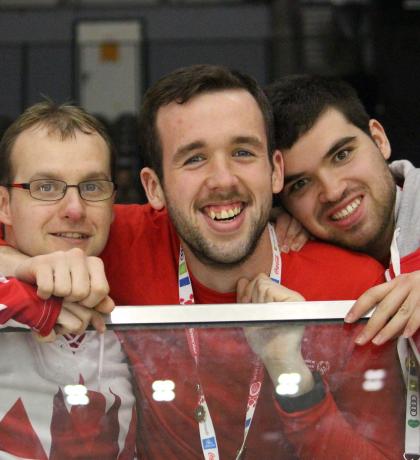
1) How/when did you first become involved with Special Olympics?
I first got involved with Special Olympics through my high school Interact Club. Interact is a Rotary sponsored initiative that encourages youth to get involved volunteering in the community. At 15 years old, I started attending Friday night bowling, marking scores. I was invited to coach the bowling team at provincial summer games that year, and I never turned back.
2) How has Special Olympics impacted your life?
To say Special Olympics has changed my life would be an understatement. When I started volunteering I was a shy teenager, who didn't really do a whole lot. I went to school, studied hard, and worked hard, but with no real "social" life. Special Olympics has given me an entire new outlook on life, and has taught me to really enjoy life. Since getting involved, almost 9 yeas ago, I have become much more social, way more outgoing and much more active in my community. I have learned to not sweat the small stuff, not stress over life's littlest struggles, and roll with the punches. We don't always choose the path we follow, but I have learned to embrace what ever path I may lead.
3) What sports do you coach with Special Olympics?
What do I coach currently or what have I coached in the past? Currently, I coach our local speed skating team, and most recently an assistant coach with Team Canada speed skating. Since becoming Regional Coordinator, and Chef de Mission at provincial games, I have been less active coaching, but still play a lead role in our curling program, and in the summer head up the bocce program. In the past, I have coached just about every sport in our region, including floor hockey, basketball, and even Rhythmic Gymnastics.
4) What is your life like outside of Special Olympics? What do you do for a living?
I currently work at Haley Street Adult Services Centre, which is workshop for adults with disabilities. I am the centres Job Coach and help participants seeking employment outside of the centre, find such employment. My job is to meet with employers, assist with client training, and job shadowing until the client is ready to work independently with little or no supervision.
5) How many hours a week to you dedicate to Special Olympics?
On average, I would estimate I give at least 10 hours a week to Special Olympics. Some weeks however, upwards of 25 hours are devoted to Special Olympics, while still working full time, and being committed to numerous other volunteer activities.
6) What is your proudest moment in life/with Special Olympics so far?
There are so many moments I could say are my proudest. Watching athletes achieve personal bests, seeing them cross first in a race, seeing hard work pay off at competition, or even seeing a shy athlete come out of their shell and make friends with fellow team mates. If I were to pick one though, I would have to say the proudest moment was watching one of my own athletes win a gold medal at the World Winter Games in Austria. She had put in a long year of hard work, and seeing her achieve the best results on a world stage was very rewarding and made me a very proud coach.
Anything else you’d like to add?
Special Olympics, I believe, has made me the person I am today. It has taught me so much about myself, and taught me even more about others. We are all so different, regardless of an intellectual disability or not; we are all different. Special Olympics opened my eyes to the world around me, and is by far the most rewarding organization I have ever given my time to, and that is why I continue to give, and will continue to do so for many years to come. My volunteering started as a helper marking bowling scores, and I never would have imagined what it would do for my life.
